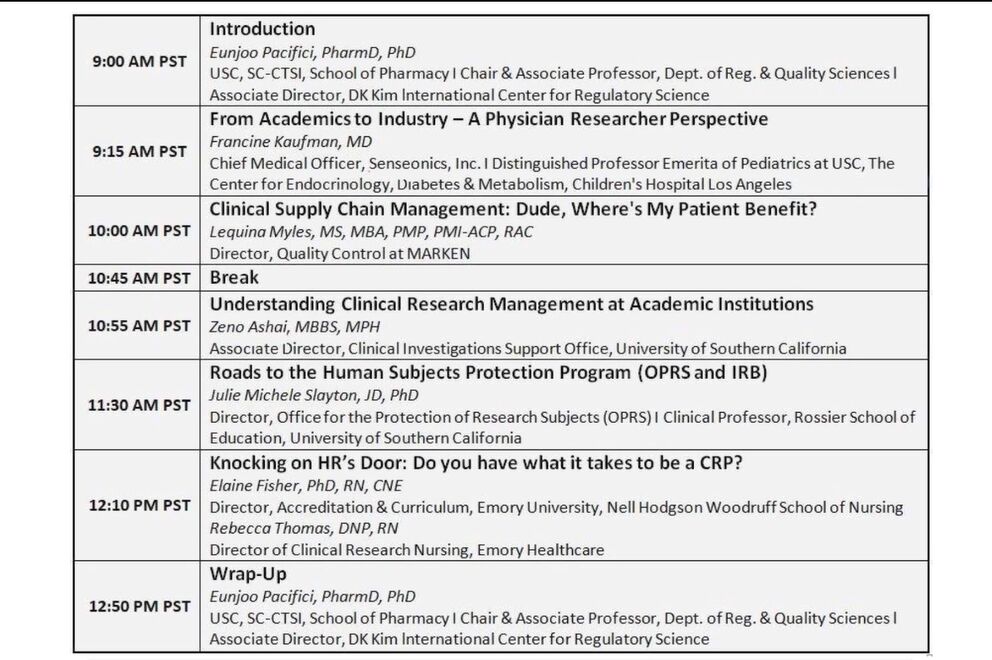- Human Subjects Protection Program
- OPRS is responsible for educating the field (including researchers, coordinators, staff, involved parties) to ensure that they understand what is required in research involving human subjects, and the policy and procedures affiliated with it
- Institutional Review Board
- Oversight body including standing committees that is charged with reviewing research involving human subjects, and functions as a surrogate human subjects advocate
- IRB members can be faculty, staff, or students of the institution and local community members
- Human subjects research must be approved by the IRB before research begins
- 4 IRB’s at USC: 3 Biomedical, 1 Social Behavioral
- OPRS Structure comprised of Director, Program Manager, Program Administration, 2 Associate IRB Directors, Admin Assistant II, IRB Student Mentor, and 16 Analysts
- Oversight body including standing committees that is charged with reviewing research involving human subjects, and functions as a surrogate human subjects advocate
- OPRS Structure comprised of Director, Program Manager, Program Administration, 2 Associate IRB Directors, Admin Assistant II, IRB Student Mentor, and 16 Analysts
- Educational and Work Experiences for OPRS/IRB
- College Degree
- Some science experience (social behavioral/biomedical)
- Not required
- Some science experience (social behavioral/biomedical)
- Master's Degree
- In the science or arts
- Not required
- In the science or arts
- PhD or MD
- Not required
- Work Experience
- Independent Research Experience
- Study Coordinator
- Volunteer on an IRB (e.g. community member)
- CIP (eventually preferred)
- College Degree
- The journey to a career in human subjects protection can look different for everyone. The career pathway for the current Director of the OPRS:
- College
- History Major, Psychology Minor, Spanish Literature Minor
- Law School
- Coursework included constitutional law, poverty law, education law, juvenile law
- Federal OJJDP: consulting with states on juvenile justice and constitutional law in schools
- Federal Clerkship
- Publishing (Harvard Constitutional Law Quarterly)
- PhD
- Education Policy, Qualitative Research, School Funding, Conference Presentations and Publications
- LAUSD
- Qualitative researcher
- Director of Research: oversight of qualitative and quantitative projects, ethic board
- Policymaker, member of Superintendents’ Cabinets
- USC
- Rossier School of Education
- Master of Arts in Teachings
- EdD in Educational Leadership
- Social Behavioral IRB Member and Chair
- Director of OPRS
- Rossier School of Education
- College
- Questions
- IRB’s are often seen as compliance checks and hoops to jump through, rather than community members and everyday people
- It is a more of a “they” rather than an “it”
- Doing research is a privilege, not a right
- IRB’s are often seen as compliance checks and hoops to jump through, rather than community members and everyday people
Regulatory Science Virtual Symposium: “Clinical Research Career Pathways” Session 5: Roads to the Human Subjects Protection Program (OPRS and IRB) (2021)
Director, Human Research Protection Program
Course Syllabus/Topics
Acknowledgement
Accompanying text created by Omer Baker, BS Human Biology Candidate | omerbake@usc.edu | Edited by Annie Ly, MS Regulatory Science Candidate | lyannie@usc.edu

